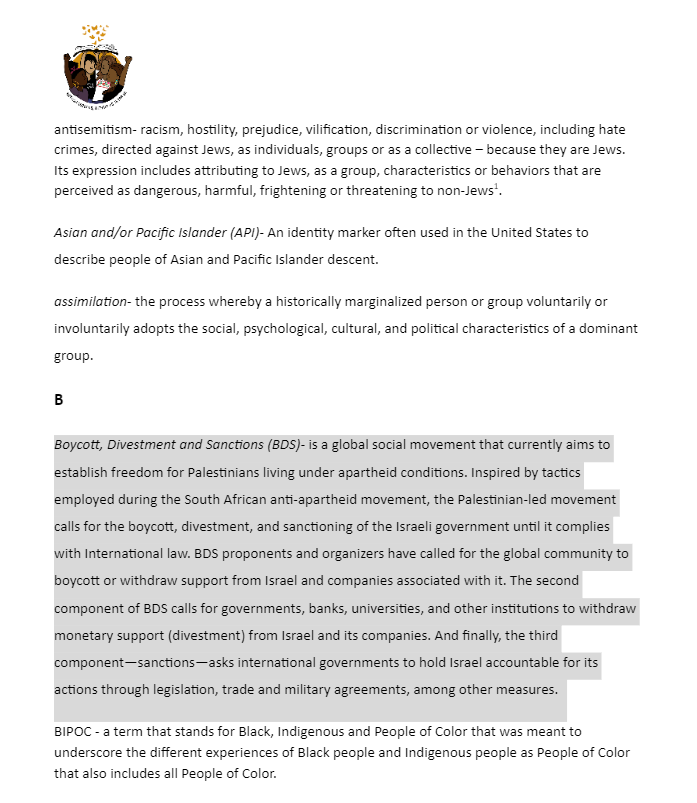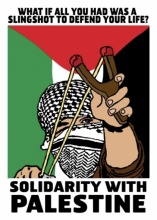
Anti-Israel, pro-BDS component in ethnic studies curriculum
Incidents
- Issues
- Antisemitism
The controversial ethnic studies consultant company, Liberated Ethnic Studies Model Curriculum Consortium, has come under scrutiny for linking on their website to Teach Palestine. They have since removed the link.
The consortium’s glossary includes Boycott, Divestment and Sanctions (BDS); defining it as “global social movement that currently aims to establish freedom for Palestinians living under apartheid conditions,” and ” Palestinian-led movement calls for the boycott, divestment, and sanctioning of the Israeli government until it complies with International law.”

Consortium faculty member Dr. Samia Shoman is the co-lead for the group’s Arab American studies. She is also co-coordinator of the Middle East Children Alliance’s Teach Palestine project, which produced the Teach Palestine curriculum.
The consortium website has previously contained a page titled “Teach Palestine”, which featured the topic “Preparing to Teach Palestine: A Toolkit.” The cached webpage stated that teachers “might want to center gentrification and forced relocation” and make a comparison such as the “impact of continuing colonial control of water resources at the US/Mexico border and in Gaza.”
A fourth iteration of the webpage contained links for resources such as “The ADL Is Not An Ally: A Primer,” “#Drop the ADL,” a webinar featured on the Arab Resource & Organizing Center (AROC) Facebook page titled “Arab American Studies, Palestine, and the Fight for Ethnic Studies,” as well as several other similar links.
The full document, “Preparing to Teach Palestine: A Toolkit,” states that “Teaching the truth about the history of the US is a liberatory act” as is “Teaching the truth about Palestine is a liberatory act.” The toolkit also states that it is important to clarify that “critical pedagogy about Israel’s role in Palestine is not antisemitic,” that “False accusations of antisemitism that rely on the conflation of the State of Israel with Jewish identity are an explicit strategy of Zionists, who portray Palestinians as motivated by antisemitism or irrational hatred rather than resistance to oppression,” and “Antisemitism— like anti-Asian, anti-Black, anti-Palestinian ,and Islamophobic attacks and rhetoric —exists in every community, but it is fostered and exploited by rightwing movements in the US and around the world that gain power by keeping us divided.”
The toolkit continues by telling teachers to be “strategic.” For example, the document states that teachers should use their position of tenure or their “white privilege” as protection when teaching this controversial curriculum. It also asks “are the JCRC, the ADL, the Jewish Federation and/or other Zionist organizations active and likely to create problems? If so, how can you build support before you begin so you’re in a strong position to withstand potential attack?”
The authors also state that if the administration is not supportive, that it might be better to “fly under the radar” or if there is a strong enough group, they should pressure the administration.
It also emphasizes that teachers in the past have “shut their doors” and taught “their students liberatory curriculum.” The document continues “Many of us trace our own politics back to one of those teachers.” Other strategies presented include:
- Making sure teachers have a “site of activism“
- Get engaged with “racial justice” committees that engage in issues like “Defunding the Police, Black Lives Matter, Immigrant Rights and other just causes.”
- Form a “Palestinian affinity caucus”
The “Teaching Palestine/ Israel Lesson Outline by Samia Shoman” document contains 25 lessons which include students evaluating “their own truth,” Zionist Congress, video clip from “Occupation 101,” the “First Intifada” and “Second Intifada.”
The Teach Palestine curriculum also includes a lesson titled “Stolen Land.” The curriculum’s author states, “Like the Palestinians, they [Native Americans] did not cross a border; the border crossed them.” In a description of a sample lesson derived from the Palestine Education Project, a map is outlined on the floor of both America and Palestine. Students are divided into “Indigenous” peoples or “colonist/ settler.” Drawing from sources such as Howard Zinn’s A People’s History of the United States (specifically Columbus and Manifest Destiny), “we begin to link the two histories together by deepening our understanding of Manifest Destiny compared to the Zionist concept of the Promised Land, the ideology that led to the colonization of Palestine.”
The lesson also includes using the poem “In America” by Palestinian American poet Suheir Hammad. The poem begins:
Right now you are on stolen land
No matter where you are hearing this poem
Below you is stolen land
The conclusion to the lesson requires students to complete some form of activism; two examples the author includes are a research project and a street theater performance. In closing, the content creator expresses their hope that “teaching about these walls opens up conversations that lead to activism on the ground and linking struggles.” Activism includes “The Palestinian movement for Boycott, Divestment, and Sanctions against the Israel occupation” as another way for students to “get involved.”
The resources section also links to “The Palestine Poster Project Archives.” Featuring a variety of images depicting resistance and solidarity.

In a Webinar put on by XITO Tucson, Shoman states that they should use the “settler colonial framework as our anchor around teaching and learning about these [colonization] issues.”
The Consortium lists its Guiding Principles and Values which includes students critiquing “empire, white supremacy, anti-Blackness, anti Indigeneity, racism, patriarchy, cisheteropatriarchy, capitalism, ableism, anthropocentrism, and other forms of power and oppression” and to “challenge imperialist/colonial hegemonic beliefs and practices on ideological, institutional, interpersonal, and internalized levels.”
We have another dispatch here that includes the work of the Middle East Children Alliance.
Stay Informed
